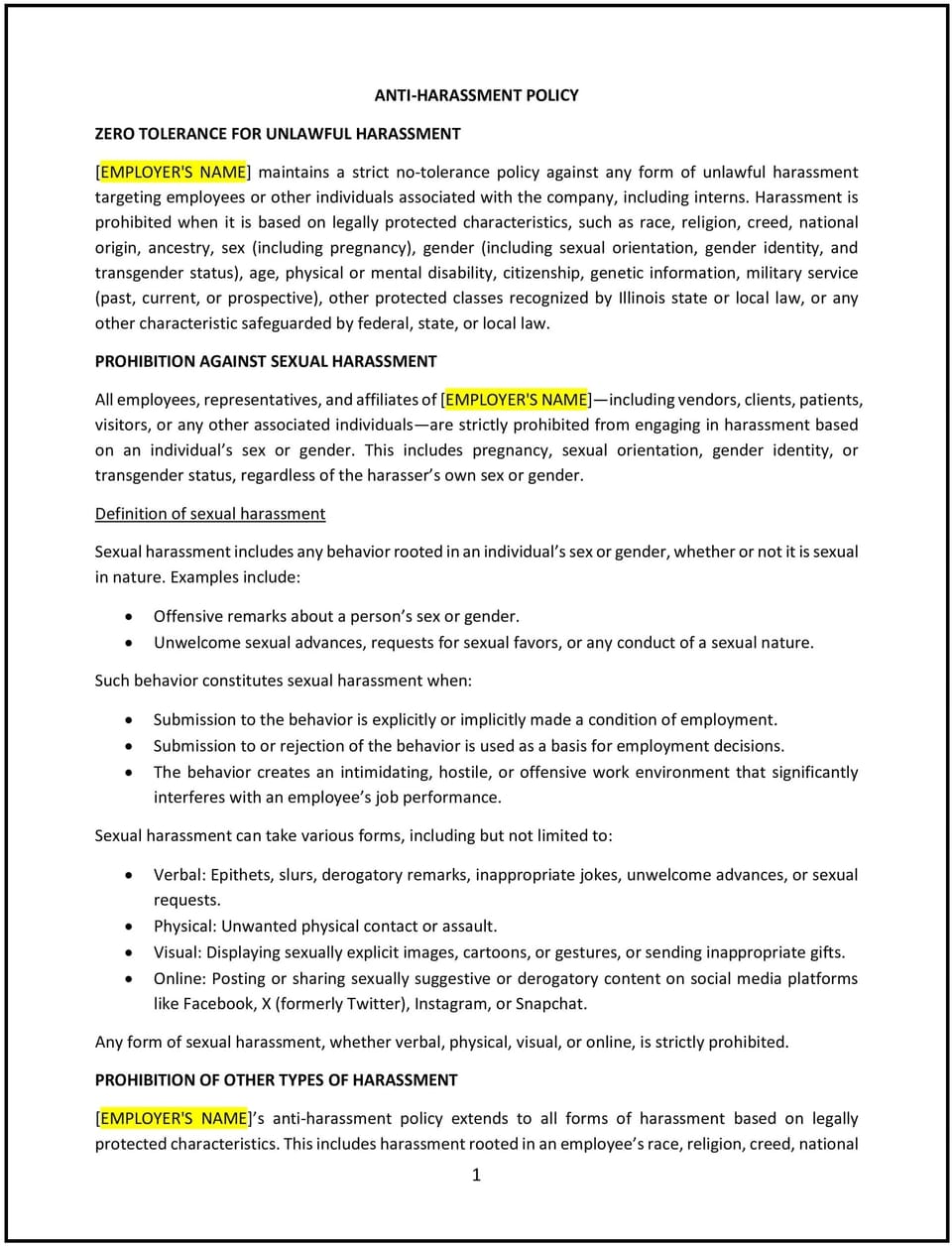Anti-harassment policy (Illinois): Free template

Anti-harassment policy (Illinois)
This anti-harassment policy is designed to help Illinois businesses create a respectful and inclusive workplace by addressing and preventing harassment. It provides guidelines for identifying, reporting, and resolving harassment incidents, ensuring compliance with Illinois employment laws and fostering a safe environment for all employees.
By adopting this policy, businesses can reduce workplace conflicts, support employee well-being, and mitigate legal risks.
How to use this anti-harassment policy (Illinois)
- Define harassment: Specify what constitutes harassment, including unwelcome behavior based on race, gender, religion, sexual orientation, age, disability, or other protected characteristics under Illinois law.
- Prohibit harassment: Clearly state that harassment of any kind is unacceptable and will result in disciplinary action, up to and including termination.
- Establish reporting procedures: Provide employees with clear instructions on how to report harassment incidents, including anonymous reporting options if available.
- Outline investigation protocols: Detail the steps the company will take to investigate harassment reports, such as gathering evidence and interviewing involved parties.
- Include anti-retaliation provisions: Assure employees that they will not face retaliation for reporting harassment or participating in investigations.
- Provide training: Offer regular training for employees and managers on recognizing, preventing, and addressing workplace harassment.
- Monitor compliance: Regularly review workplace practices and policies to ensure adherence to anti-harassment standards and Illinois laws.
Benefits of using this anti-harassment policy (Illinois)
This policy provides several benefits for Illinois businesses:
- Promotes a respectful workplace: Establishes clear expectations for behavior and fosters a culture of inclusion and respect.
- Supports legal compliance: Aligns with Illinois laws, including the Illinois Human Rights Act, to prevent legal disputes and liabilities.
- Enhances employee trust: Demonstrates the company’s commitment to protecting employees from harassment and addressing concerns promptly.
- Reduces workplace conflicts: Provides a structured approach to resolving harassment incidents and maintaining workplace harmony.
- Encourages accountability: Sets clear consequences for violations and ensures consistent enforcement.
Tips for using this anti-harassment policy (Illinois)
- Communicate the policy: Share the policy with employees during onboarding and ensure it is accessible in employee handbooks or internal systems.
- Foster a supportive environment: Encourage open communication and create a culture where employees feel comfortable reporting concerns.
- Train managers: Equip managers to handle harassment complaints effectively and in compliance with this policy and Illinois laws.
- Conduct regular audits: Periodically assess workplace practices to ensure alignment with this policy and identify potential areas for improvement.
- Update as needed: Revise the policy to reflect changes in Illinois laws, workplace dynamics, or best practices.
Q: What behaviors are considered harassment under this policy?
A: Harassment includes unwelcome behavior based on protected characteristics such as race, gender, religion, or disability, as defined under Illinois law.
Q: How can employees report harassment?
A: Employees can report harassment to their manager, HR, or through the company’s anonymous reporting system, if available.
Q: What steps are taken after a harassment report is made?
A: The company investigates the report promptly, gathers evidence, and takes appropriate corrective action based on the findings.
Q: Are employees protected from retaliation for reporting harassment?
A: Yes, the company strictly prohibits retaliation against employees who report harassment or participate in investigations.
Q: Is harassment training mandatory?
A: Yes, regular training is provided to all employees and managers to ensure awareness and compliance with this policy.
Q: How often is this policy reviewed?
A: This policy is reviewed annually or whenever significant changes occur in Illinois laws or workplace practices.
Q: Can harassment complaints be made anonymously?
A: Yes, employees can report harassment anonymously through designated reporting channels.
Q: What resources are available for employees affected by harassment?
A: Employees can access resources such as counseling services or employee assistance programs (EAPs) for support.
This article contains general legal information and does not contain legal advice. Cobrief is not a law firm or a substitute for an attorney or law firm. The law is complex and changes often. For legal advice, please ask a lawyer.


